Alexander
Directed by Oliver Stone
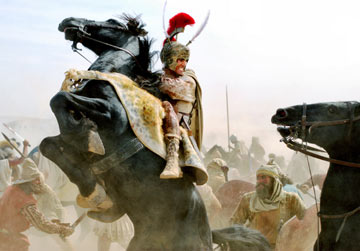 Trying to sum up the life of legendary conqueror Alexander the Great in a single film is perhaps too ambitious – Oliver Stone’s Alexander is a nice looking movie with some impressive battle scenes. It falls short of the potential inherent in the subject matter for several reasons but the biggest problem is trying to cover too much history – too many events, too many conflicts among characters -- in a three-hour film. This was an extremely ambitious project and, for that reason, I’m willing to cut it some slack critically – I recommend it in spite of many flaws. An obvious alternative to cramming the whole of Alexander’s life into one movie would have been to introduce him and a few other important characters then cover, in more detail, just one of his military campaigns – the conquest of Persia would be an appealing choice. Trying to sum up the life of legendary conqueror Alexander the Great in a single film is perhaps too ambitious – Oliver Stone’s Alexander is a nice looking movie with some impressive battle scenes. It falls short of the potential inherent in the subject matter for several reasons but the biggest problem is trying to cover too much history – too many events, too many conflicts among characters -- in a three-hour film. This was an extremely ambitious project and, for that reason, I’m willing to cut it some slack critically – I recommend it in spite of many flaws. An obvious alternative to cramming the whole of Alexander’s life into one movie would have been to introduce him and a few other important characters then cover, in more detail, just one of his military campaigns – the conquest of Persia would be an appealing choice.
One thing that Mr. Stone was trying to do in the film was to get under Alexander’s skin – to analyze his motivation and drive to conquer the world. Colin Farrell’s Alexander is full of the passion that one would need to conquer the world but the attempt to explain his ambition via his relationships with his parents fell flat. I was ok with the idea that he wanted to prove himself a worthy successor to his father, King Phillip II (Val Kilmer), but the attempt to portray his tortured relationship with his mother, Queen Olympias (a terribly miscast Angelina Jolie) couldn’t explain his high-achieving life -- more on the Olympias character later. Alexander also should have come across as someone wise beyond his years – he died at 32 – to make it believable that all of these people would trust him to the extent of putting their lives in his hands. While Colin Farrell did a great job of projecting rage and passion, he didn’t seem to possess the gravitas of a world leader – which the real Alexander certainly was.
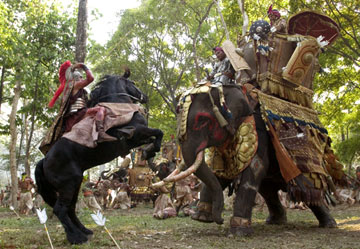 Alexander excels visually – production design, costuming, and cinematography are beautifully executed. I love movies that take me away in time and space to exotic places and this one fit that bill by going back to the Middle East and Asia of the third century B.C. All of the battle scenes are impressively filmed – foot soldiers slashing and stabbing while the mounted cavalry move quickly on the battlefield for tactical advantage. There are also some overhead shots of the battles (possibly digital) that gave the audience a sense of how the two sides are positioning themselves. The film is thought-provoking in spite of the flaws – Alexander the Great is an historical figure that I’ve heard about since I was a small child. He changed the world – bridging the gap between the Mediterranean and Asian civilizations with his conquests. Alexander excels visually – production design, costuming, and cinematography are beautifully executed. I love movies that take me away in time and space to exotic places and this one fit that bill by going back to the Middle East and Asia of the third century B.C. All of the battle scenes are impressively filmed – foot soldiers slashing and stabbing while the mounted cavalry move quickly on the battlefield for tactical advantage. There are also some overhead shots of the battles (possibly digital) that gave the audience a sense of how the two sides are positioning themselves. The film is thought-provoking in spite of the flaws – Alexander the Great is an historical figure that I’ve heard about since I was a small child. He changed the world – bridging the gap between the Mediterranean and Asian civilizations with his conquests.
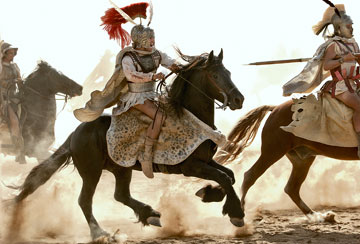 What drove him to conquer most of the known world is the fascinating question at the center of the film. The explanation that Mr. Stone was clearly going for -- that Alexander’s tormented relationships with his parents caused him to lash out at the world – didn’t gel for me due mainly with the problems with the mother character. Alexander is also portrayed as a benevolent ruler – a la late 20th century. I don’t buy that – I think that the filmmakers just wanted to make the character more sympathetic. The real Alexander was almost certainly motivated primarily by lust for wealth and power, not a desire to bring disparate groups of people together. What drove him to conquer most of the known world is the fascinating question at the center of the film. The explanation that Mr. Stone was clearly going for -- that Alexander’s tormented relationships with his parents caused him to lash out at the world – didn’t gel for me due mainly with the problems with the mother character. Alexander is also portrayed as a benevolent ruler – a la late 20th century. I don’t buy that – I think that the filmmakers just wanted to make the character more sympathetic. The real Alexander was almost certainly motivated primarily by lust for wealth and power, not a desire to bring disparate groups of people together.
As Alexander takes us to all of these exotic locales almost three thousand years ago, we get to see some impressive sights – and I appreciate that – but it would have been interesting to get to know some of the people involved. If the filmmakers had developed the character of the Persian King, for example, and contrasted the Macedonian culture with the Persian, the viewer would have had a richer experience – a better historical concept of was happening as the Macedonians defeated the Persians. That would have taken more screen time and necessitated limiting the scope of the film – which would have been a good idea for other reasons.
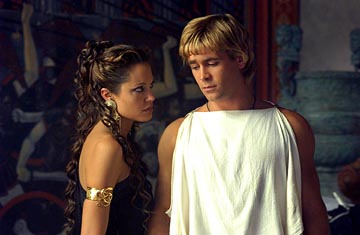 What on earth were they thinking of department: the casting of Angelina Jolie as Alexander’s mother, Olympias, was just so wrong in so many ways – writing and direction as well as acting. She is obviously much too young to be plausible as Colin Farrell’s mother which made their scenes together look all wrong since they’re about the same age. If that’s not enough, she spoke her lines with an accent that reminded me of Natasha from Rocky and Bullwinkle and veered into melodrama -- way over the top -- in her portrayal of a hard-driving mother who resents her ex-husband (Phillip II) for leaving her for another woman and pushes Alexander to out-do his father. At one point, right after apparently engineering the murder of Phillip, who Alexander loved in spite of their differences, she asks Alexander why he’s always so angry at her – the scene as written just doesn’t make sense. I hear so much about how there aren’t enough parts for actresses over 40 or so. This would have been a wonderful part for somebody like Meryl Streep or Glenn Close – two great performers, either of whom would have brought so much to this crucial part. What on earth were they thinking of department: the casting of Angelina Jolie as Alexander’s mother, Olympias, was just so wrong in so many ways – writing and direction as well as acting. She is obviously much too young to be plausible as Colin Farrell’s mother which made their scenes together look all wrong since they’re about the same age. If that’s not enough, she spoke her lines with an accent that reminded me of Natasha from Rocky and Bullwinkle and veered into melodrama -- way over the top -- in her portrayal of a hard-driving mother who resents her ex-husband (Phillip II) for leaving her for another woman and pushes Alexander to out-do his father. At one point, right after apparently engineering the murder of Phillip, who Alexander loved in spite of their differences, she asks Alexander why he’s always so angry at her – the scene as written just doesn’t make sense. I hear so much about how there aren’t enough parts for actresses over 40 or so. This would have been a wonderful part for somebody like Meryl Streep or Glenn Close – two great performers, either of whom would have brought so much to this crucial part.
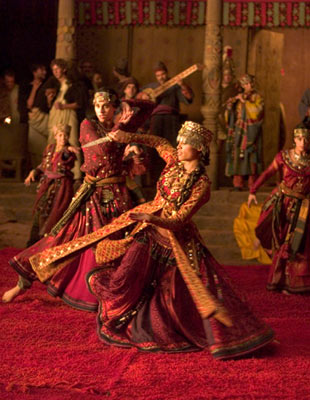 And then there’s the matter of the controversial portrayal of Alexander’s interest in men – although the movie never gets explicit, he clearly loves his childhood friend, Hephaistion (Jared Leto) more than he loves any of the women in his life. Apparently the Greeks are mad about that – and evidently, they are suing the producers of the film for insulting their historical hero. There is a problem beyond Alexander’s bi-sex tendencies – he wasn’t Greek but Macedonian, which the film makes pretty clear, so he isn’t really a Greek hero, according to the film. There is even a scene where Phillip II (also a Macedonian) mentions that he brought the Greeks and the Macedonians together – after he conquered the Greeks! Ouch! If the hard-core Greek nationalists see the movie, that little factoid might bother them more that than Alexander’s sexuality. And then there’s the matter of the controversial portrayal of Alexander’s interest in men – although the movie never gets explicit, he clearly loves his childhood friend, Hephaistion (Jared Leto) more than he loves any of the women in his life. Apparently the Greeks are mad about that – and evidently, they are suing the producers of the film for insulting their historical hero. There is a problem beyond Alexander’s bi-sex tendencies – he wasn’t Greek but Macedonian, which the film makes pretty clear, so he isn’t really a Greek hero, according to the film. There is even a scene where Phillip II (also a Macedonian) mentions that he brought the Greeks and the Macedonians together – after he conquered the Greeks! Ouch! If the hard-core Greek nationalists see the movie, that little factoid might bother them more that than Alexander’s sexuality.
Incidentally, a controversy has been brewing for the last 15 years or so over the name of the former-Yugoslav republic on the land commonly known as Macedonia – the Greeks don’t want them to use that name since they have a province in the north of Greece named “Macedonia” and they’re afraid that it could cause an increase in Macedonian nationalism in that area if there is a state called “The Republic of Macedonia” to their north. Until now, Greek lobbying has prevented the official recognition of that name by all of the EU and most of the world. However, on November 4, 2004 (two days after winning re-election) George W. Bush decided to recognize “The Republic of Macedonia” -- the name by which they want to be known – and the Greeks are none too happy. The point to this digression is that the movie reinforces the idea that the Greeks and Macedonians are two distinct ethnic groups, which is the Macedonian position.
For all its flaws, Alexander is a visually stunning historical epic that got me thinking about a fascinating period of history and possibly the most prolific conqueror of all time. The film is a must for history buffs and an impressive action movie if you favor swords-and-sandals adventure movies.
Special Note: I just read some comments by Oliver Stone regarding what he would do differently if he had it to do over. Among his comments: shorten it to 2 ½ hours; put the events in linear order; reduce the amount of voice-over narration (by Anthony Hopkins.) I agree that all three of those changes would have improved the film, particularly getting rid of the narration. However, the basic problem of trying to cover too much material in the (now reduced) 2 ½ hours would remain – he didn’t mention reducing the scope of the film to just one campaign – my suggestion. He also said that he would cut a special version of Alexander for places like the U.S., Greece and Korea – without the gay-sex element. That would divide the film into two films -- significantly different portraits of Alexander the Great. When he decided to inject homosexuality into the script, he had to know that he was playing with fire – I’m convinced that he did it deliberately, anticipating the controversy -- aka free publicity – that would follow. Now he seems to want it both ways: he’ll take all the media attention but complains when they, the press, dwell on the controversial issue that he knowingly inserted.
Photographs are copyright Warner Brothers.
For more information about this film including detailed cast and crew credits, check out The Internet Movie Database by clicking here.
e-mail me
|

